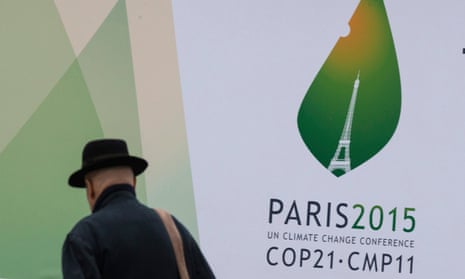Talks between the French foreign minister, Laurent Fabius, and campaigners over the fate of a huge march before the forthcoming Paris climate summit have ended without agreement.
In the wake of attacks in Paris last Friday, the French government proposed scaling down the protest from a march on 29 November – which organisers had hoped would draw hundreds of thousands of people – to a stationary rally.
One activist source said organisers would respond flexibly to Fabius’s suggestions, but that a “kettled” rally of 5,000 people held in the Paris suburbs “would not be acceptable”.
The crucial UN climate conference, which has been in planning since 2011, will go ahead with heightened security, President François Hollande has said. But French security forces are understood to favour a blanket ban on public demonstrations around it.
Fabius expressed fears on Tuesday about the risk of another terror attack and of the sort of crowd panic seen in Paris’s Place de République on 15 November, when hundreds of people fled a solidarity vigil after firecrackers were let off.
“His [Fabius’s] message was very clear,” said Alix Mazounie, a Climate Action Network France campaigner who was in the meeting. “It was ‘I want to ensure that there is a form of public expression but that we need to potentially revise the format of these mobilisations’. His concern was for safety in open public spaces.”
Campaigners argue that suspending civil society norms would play into the terrorists’ agenda.
“We can think of few better responses to violence and terror than this movement’s push for peace and hope. No matter the final plans for the march in Paris, we urge people join other global climate marches around the world to show their solidarity and support,” said Alice Jay, of the campaign group Avaaz.
“This is not time to step back,” Mazounie said. “We are in a country of free expression – that has always been the source of our power. This will be about unity, solidarity and peace, as well as climate change.
“We reaffirmed [to Fabius] our commitment to mobilisations across both weeks of the COP [the conference of the parties, the UN climate summit that opens on 30 November and runs for a fortnight].”
Several protests are planned in this period, including a march on 29 November, a “People’s Summit” on 5 and 6 December, a “climate action zone” involving schools and community groups, and a day of civil disobedience at the summit’s end.
More meetings are expected between the campaigners and French government officials over the coming days. A final decision is expected to be taken by the French prime minister, Manuel Valls.
The Paris protests are being organised by Coalition Climat 21, an alliance of civil society groups, which has pledged to try to continue with public demonstrations in Paris, though in close consultation with the police.
The issue has been a fraught one for many campaigners and organisers, not least because several were caught up in the horror of the Paris attacks.
“We have friends who died,” said John Jordan, a prominent activist involved in plans for civil disobedience at the summit’s end. “One of my closest friends, an organiser, was in the middle of it all. But we can’t afford to let this derail our movement.”
He added: “One idea is to decentralise the whole thing and tell people: ‘Now is the time to really take disobedience into your own cities.’ That was always part of the plan but maybe it needs to be ramped up.”
However, French campaigners report that many organisations are no longer prepared to mobilise on the street ahead of the summit in the fearful atmosphere engulfing the French capital.
At its opening, heads of state and government are expected to be in attendance, with heightened security for them. Barack Obama, Xi Jinping, Narendra Modi, Angela Merkel and David Cameron are all expected to attend.
None of the more than 80 leaders who had confirmed have publicly pulled out of the conference, and US officials have said Obama will still attend despite the attacks.
The UN is also stepping up its security at the conference. Security within the venue and at exits and entrances is controlled by UN uniformed armed guards, but outside the Le Bourget complex and in the surrounding area the French security forces will be in command.
